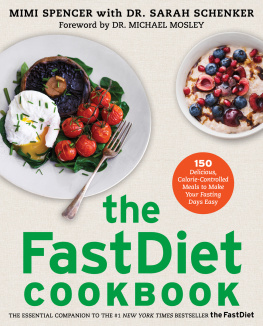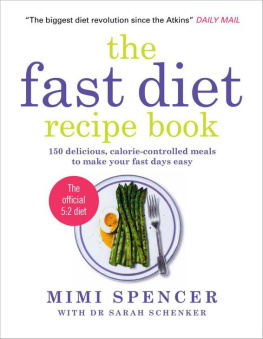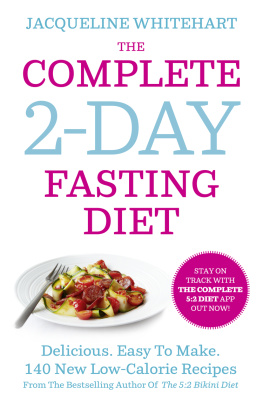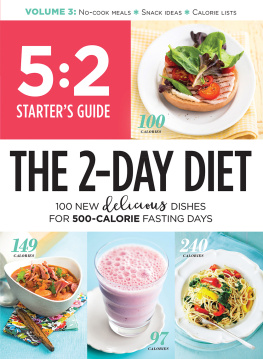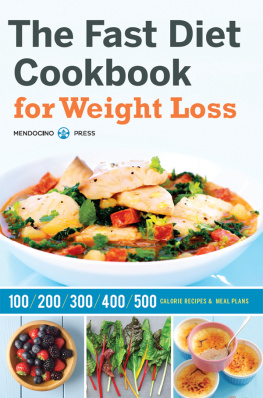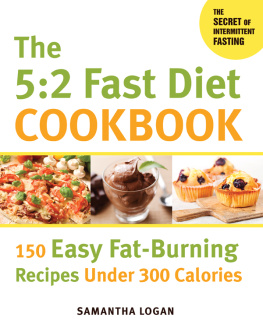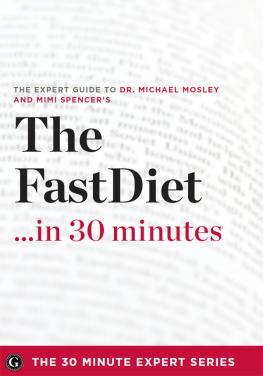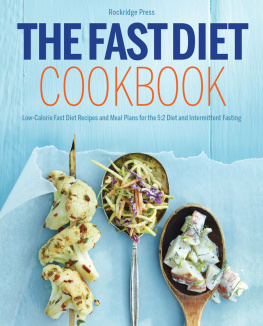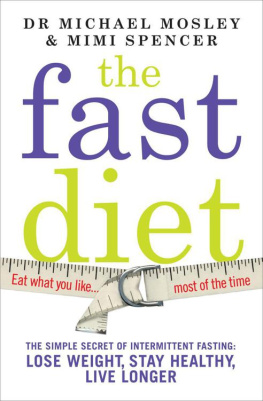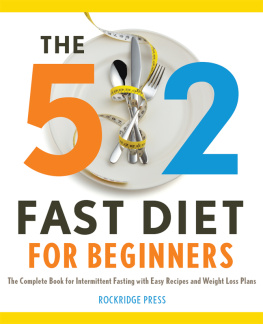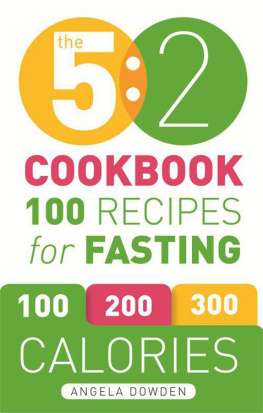Thank you for downloading this Atria Books eBook.
Join our mailing list and get updates on new releases, deals, bonus content and other great books from Atria Books and Simon & Schuster. C LICK H ERE T O S IGN U P or visit us online to sign up at
eBookNews.SimonandSchuster.com

contents
CHAPTER ONE
ALL YOU NEED TO KNOW ABOUT THE FASTDIET
How the FastDiet Went Global
When Dr. Michael Mosley and I started to sketch out plans for The FastDiet in October 2012, we had little idea that its impact would prove to be so great. In the months since, the book has received a hugely positive response, and interest around the world is growing daily, in Korea, Brazil, Israel, Australia, Taiwan, the United Statesanywhere people are looking for a leaner, fitter life. Hundreds of people have written to us, often with great tenderness and emotion, about their weight loss and health improvements.
There has been much enthusiasm from people in the public eye, too. As British food writer and cook Hugh Fearnley-Whittingstall wrote in the newspaper The Guardian, I find myself beguiled, for the first time ever, really, by a new diet. The FastDiet, by Michael Mosley and Mimi Spencer, makes a compelling promise that with regular fasting (they propose two days out of every seven) you will quickly lose weight... I believe in this fasting thing, I really do... Ive lost eight pounds already, and I find the whole thing rather exhilarating. I feel I might just be part of a health revolution.
Allison Pearson, a columnist at The Daily Telegraph , described The FastDiet as her new bible and added, I no longer feel the need to sleep in the afternoon. My stomach has definitely shrunk. The other night it protested when I tried to finish dinner: a world first. Scientists swear that the fasting diet will add years to your life. Me, Im just happy to have finally shifted that stubborn baby weight. About time, too.
The baby was seventeen last week. At thefastdiet.co.uk, the comments and questions keep rolling in. The FastDiet has always been a conversation, never a set of commandments; we are not interested in promoting diet dependency, only in investigating an idea that appears to have significant health-giving potential. So were fascinated by your stories, your successes, and your occasional blips, and as the science develops, we hope to have more answers to share. In the meantime, many of you have requested inspiration for what to eat on your twice-weekly fast days. If youll excuse the obvious oxymoron, The FastDiet Cookbook is our answer.
But before we pull on an apron and raid the fridge, its worth taking a brief detour into the science behind intermittent fasting, and how the FastDiet came to be.
In the Beginning...
In 2012, Dr. Michael Mosley, an overweight medically trained journalist, discovered that he was a borderline diabetic with very high levels of bad cholesterol. He was told by his doctor that he needed to start medication and that unless he did something about it, within ten years he would be swallowing eight pills a day, like the average sixty-year-old European or American. Keen to find a nonpharmaceutical way to change his fate, he tracked down and interviewed scientists doing cutting-edge research into intermittent fasting. Fasting, in this context, does not mean avoiding all food; it simply means cutting back, for relatively short periods of time, on some foods.
In our society, we tend to eat all the timeand that constant overeating doesnt just make us fat; it also keeps our bodies in permanent go mode. This leads to elevated levels of hormones like insulin and IGF-1 (insulin-like growth factor 1), which cause metabolic changes in the body. While this is a perfectly normal response to eating, the problem comes when these hormones dominate all the time; this can bring an increased risk of developing a range of diseases including diabetes, heart disease, and some cancers. Cutting back on calories, by contrast, reduces insulin levels and gives your system a chance to rid itself of old and worn-out cellsa bit like taking your car into the garage for an occasional tune-up; doing so will almost certainly ensure that it goes on running in peak condition for longer.
The Importance of Fat Loss Versus Weight Loss
Weight is, of course, easy to measureyou just need a bathroom scale. But what people sometimes forget in their obsession with losing weight is that what they really want to lose is fat.
Not all fat, however, is equally bad. Fat on the thighs and buttocks, for example, appears to be less of a health risk than excess belly fat, known as visceral fat. Visceral fat significantly increases the risk of heart disease and diabetes, which is why you should aim to have a waist (as measured around your belly button) that is less than half your height. While losing fat, you want to preserve as much muscle as possible. One reason this is important is that muscle is metabolically active; in other words, if you take two people who are the same weight, but one is muscular and the other fat, the muscular one not only is likely to be healthier but also will burn more calories, even when sleeping. People with more muscle have a better chance of keeping weight off.
You can help preserve muscle by maintainingor better still, increasingthe amount you exercise. This could simply mean walking more and always taking the stairs, or performing more vigorous activities such as weight training. As an added bonus, studies have shown that you are likely to burn more fat if you exercise in the fasted state rather than in the fed state.
Intermittent Fasting and Fat Loss
One of the great problems with crash diets or yo-yo dieting is that although some of the weight you lose will be fat, much of it will be muscle: On a conventional diet you will lose about 75 percent of the weight as fat and 25 percent as muscle. When you regain the weight, as most people inevitably do, the weight you regain is almost all fat. The human trials that have been done so far suggest that intermittent fasting is unusual in that the weight loss appears to be almost all fat, and, importantly, much of the fat you lose is the dangerous type from around the gut.
A number of studies involving overweight volunteers doing ADF (alternate-day fasting) found that when individuals were asked to eat a quarter of their normal calories one day, then eat whatever they liked the next, they lost significant amounts of weight and saw substantial improvements in their cholesterol and blood sugars. A surprising finding was that when allowed to feast, people did not do so. They reported not feeling particularly hungry after a fast day and rarely ate more than 110 percent of their normal calories. This is borne out by anecdotal evidence, too: Many people on the FastDiet simply dont feel ravenous the following day. Their appetite and attitudes toward food seem to change, and healthier eating seems to become part of their everyday life. Another surprising finding was that on this form of IF, individuals lost more body fat than expected.
In the most recent study of thirty-two volunteers followed for three months, the average weight loss was nearly 9 pounds, almost all fat, and they lost an average of 3 inches around the waist. In another study, 107 women were randomly allocated either to a diet where they cut their food intake to 650 calories for two days a week and tried to stick to a healthy diet for the rest of the week, or to a diet where they consumed the same total number of calories, but spread out over the week. After six months, the two-day fasters had lost an average of 131/4 pounds of fat and 3 inches from their waists, compared with 103/4 pounds and 2 inches for the daily dieters. They also had much greater improvements in their cholesterol and insulin levels.
Next page
